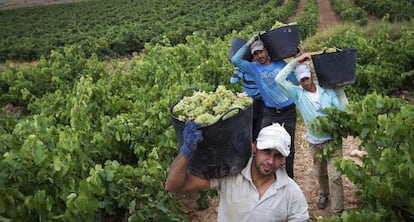Rioja winery sparks war after leaving denomination of origin system
Artadi’s decision leaves 60 other small producers also mulling exit from regulation board

The new year has failed to bring peace to Spain’s La Rioja wine-producing region. The decision by the small but influential Artadi winery to leave the La Rioja denomination of origin (DO) – the regulatory board overseeing the quality of the region’s wines – could prompt around 60 other small producers to do the same in protest at what they see as the failure of the regional government to properly represent their interests.
La Rioja’s big producers, such as Faustino, Marqués de Riscal and El Coto, are against creating new DOs
“This is a war about business models,” says Juan Carlos López de Lacalle, the managing director of Artadi, which is based in the town of Laguardia, in the Basque province of Álava. “My goal is to produce small amounts of wine that stand out from the competition,” he explains.
More than 500 wineries belong to the Rioja DO, which covers three production areas: Rioja Alta, Rioja Baja, and in the case of Artadi, the Rioja Alavesa. Lacalle wants to create separate DOs for these three sub-divisions, pointing out that about 300 La Rioja DO wineries are based in Álava, which produces around 22% of its grapes and around 36% of the wine bearing the Rioja DO.
ABRA, the Association of Álava Wine Producers, of which Artadi is a member, says that creating an Álava DO would also help boost sales throughout the Basque region. Of the 60,000 hectares of land recognized by the Rioja DO, just 80 are cultivated by Artadi.
Sales of La Rioja DO wines have grown steadily over the last three decades, and it is now one of the best-known wine-growing regions in the world. But ABRA is now saying that the time has come to recognize what it believes are significant differences between wines produced there. More than 37% of the 280 million liters of wine made in the region, worth a total of €1.2 billion, is sold abroad. The United Kingdom, Germany, the United States, and Switzerland are the main overseas markets.
The Rioja DO regulatory council recently proposed allowing smaller wine growers, sometimes known as terroir producers, to provide more information about the specific qualities of their wine on their labels, but without indicating precise geographic details. It argues that micro-wineries such as Artadi benefit from the prestige associated with the Rioja DO, Spain’s oldest, created in 1925.
ABRA supports its arguments for dividing the Rioja DO up into smaller divisions, saying that in France’s Burgundy wine-producing region there are areas of up to three hectares that have their own denomination of origin.
La Rioja’s big wine producers, such as Faustino, Marqués de Riscal, Valdemar and El Coto, are against creating new DOs. The regulatory board says it regrets Artadi’s decision, stating in a press statement that the winery’s decision to leave is a “unilateral rejection of the added value” of the DO, while at the same time recognizing the “undeniable contribution” of Artadi to the DO.
Tu suscripción se está usando en otro dispositivo
¿Quieres añadir otro usuario a tu suscripción?
Si continúas leyendo en este dispositivo, no se podrá leer en el otro.
FlechaTu suscripción se está usando en otro dispositivo y solo puedes acceder a EL PAÍS desde un dispositivo a la vez.
Si quieres compartir tu cuenta, cambia tu suscripción a la modalidad Premium, así podrás añadir otro usuario. Cada uno accederá con su propia cuenta de email, lo que os permitirá personalizar vuestra experiencia en EL PAÍS.
¿Tienes una suscripción de empresa? Accede aquí para contratar más cuentas.
En el caso de no saber quién está usando tu cuenta, te recomendamos cambiar tu contraseña aquí.
Si decides continuar compartiendo tu cuenta, este mensaje se mostrará en tu dispositivo y en el de la otra persona que está usando tu cuenta de forma indefinida, afectando a tu experiencia de lectura. Puedes consultar aquí los términos y condiciones de la suscripción digital.









































